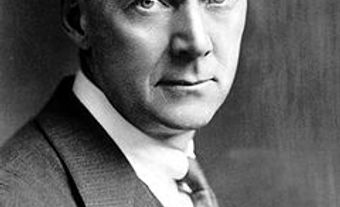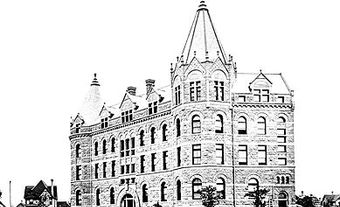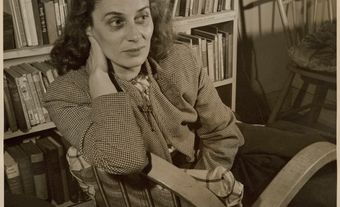Edwin John Dove (E.J.) Pratt, CMG, FRSC, poet, professor, critic (born 4 February 1882 in Western Bay, Newfoundland; died 26 April 1964 in Toronto, Ontario). E.J. Pratt was one of Canada’s leading poets of the 20th century. His work was recognized by three Governor General’s Awards (1937, 1940, 1952) and by the Canada Council Medal for distinction in literature (1961). Pratt received many honours in his lifetime, including Companion of the Order of St. Michael and St. George (1946).

Early Life, Education and Family
Edwin John Dove (E.J.) Pratt was the son of Reverend John Pratt, a Methodist minister, and Fanny Pitts Knight. Pratt grew up in a succession of Newfoundland outports, completing his schooling at the Methodist College, St John's. After teaching for two years, he became a candidate for the Methodist ministry in 1904; he served a three-year probation before entering Victoria College, University of Toronto, where he studied theology and psychology. He received his PhD from the University of Toronto in 1917.
Pratt married writer Viola Leone Whitney on 20 August 1918; the couple’s daughter, Mildred Claire, was born on 18 March 1921.
Academic Career
E.J. Pratt was ordained in 1913 but never served as a regular minister. From 1913 to 1920, he served an assistant minister at churches in Streetsville [Mississauga], Ontario, and as a demonstrator-lecturer in psychology at the University of Toronto. In 1920, he was appointed to the department of English at Victoria College, where he taught until retirement in 1953.
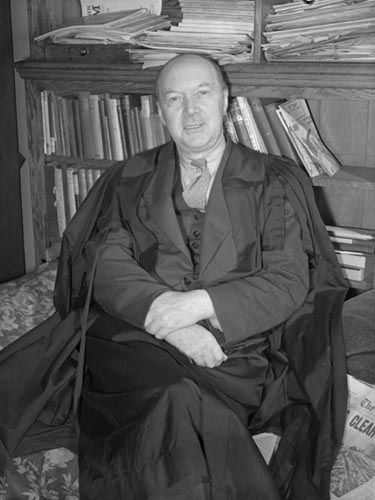
Celebrated Poet
E.J. Pratt began publishing poetry in 1914 but made no notable impression until Newfoundland Verse (1923). Thereafter, he established himself as the foremost Canadian poet of the first half of the century, publishing a dozen volumes of poetry, from The Witches' Brew and Titans in 1926 to Collected Poems in 1958. Pratt was also founder and first editor (1936–43) of The Canadian Poetry Magazine.
Pratt was elected to the Royal Society of Canada in 1930 and was awarded its Lorne Pierce Medal for poetry in 1940. Three books of his poetry won Governor General's Awards: The Fable of the Goats and Other Poems (1937), Brébeuf and His Brethren (1940)
and Towards the Last Spike (1952). In 1946, he was made a Companion of the Order of St. Michael and St. George (CMG) by King George VI.
Poetry
E.J. Pratt's poetry frequently reflects his Newfoundland background, though specific references to it appear in relatively few poems, mostly in Newfoundland Verse. But the sea and maritime life are central to many of his poems. This is true both for his short poems (e.g., "Erosion," "Sea-Gulls," "Silences") and long poems, such as The Cachalot (1926), which describes duels between a whale and its foes, a giant squid and a whaling ship and crew. The Roosevelt and the Antinoe (1930), another of Pratt’s narrative poems, recounts the heroic rescue of the crew of a sinking freighter in a winter hurricane. The Titanic (1935) is an ironic retelling of a well-known marine tragedy (see Titanic); and Behind the Log (1947) is the dramatic story of the North Atlantic convoys during the Second World War (see Battle of the Atlantic).
Sea Gulls
For one carved instant as they flew,
The language had no simile—
Silver, crystal, ivory
Were tarnished. Etched upon the horizon blue,
The frieze must go unchallenged, for the lift
And carriage of the wings would stain the drift
Of stars against a tropic indigo
Or dull the parable of snow.
Now settling one by one
Within green hollows or where curled
Crests caught the spectrum from the sun,
A thousand wings are furled.
No clay-born lilies of the world
Could blow as free
As those wild orchids of the sea.
Themes from science and technology also appear frequently in his work, and during the 1930s his poems manifested much concern with contemporary economic and social problems; The Fable of the Goats (1937) was an antiwar poem written on the eve of the Second World War. In Brébeuf and His Brethren (1940) and Towards the Last Spike (1952), Pratt turned to specifically Canadian, historical, heroic themes, in the former recounting the martyrdoms of the Jesuit missionaries to Huronia in the 17th century, and in the latter giving a dramatic account of the building of the Canadian Pacific Railway.
Pratt presents a generally realistic, unsentimental view of life, often tinctured with humour and irony. The qualities he most values and celebrates are courage, self-sacrifice, loyalty and defiance of oppressors. A major poet, he is, nevertheless, an isolated figure, belonging to no school or movement and directly influencing few other poets of his time.
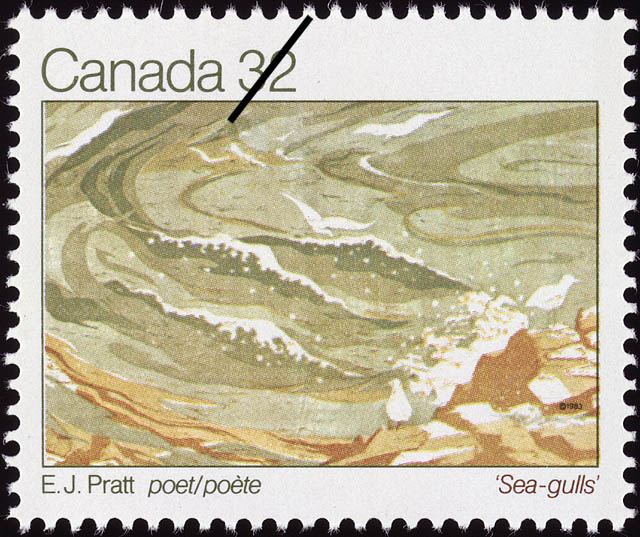
Honours and Awards
Fellow of the Royal Canadian Society (1930)
Governor General’s Award for The Fable of the Goats and Other Poems (1937)
Governor General’s Award for Brébeuf and His Brethren (1940)
Lorne Pierce Gold Medal, for distinguished services to Canadian literature, Royal Canadian Society (1940)
Companion of the Order of St. Michael and St. George (1946)
Governor General’s Award for Towards the Last Spike (1952)
Canadian Council Medal, for distinction in literature (1961)
Select Publications
Studies in Pauline Eschatology (1917)
Rachel: A Sea Story of Newfoundland in Verse (1917)
Newfoundland Verse (1923)
The Witches’ Brew (1926)
Titans (1926)
The Cachalot (1926)
The Iron Door: An Ode (1927)
The Roosevelt and the Antinoe (1930)
Many Moods (1932)
The Titanic (1935)
The Fable of the Goats and Other Poems (1937)
Brébeuf and His Brethren (1940)
Dunkirk (1941)
Still Life and Other Verse (1943)
They are Returning (1945)
Behind the Log (1947)
Ten Selected Poems (1947)
Towards the Last Spike (1952)
Here the Tide Flows (1962)

 Share on Facebook
Share on Facebook Share on X
Share on X Share by Email
Share by Email Share on Google Classroom
Share on Google Classroom

